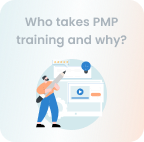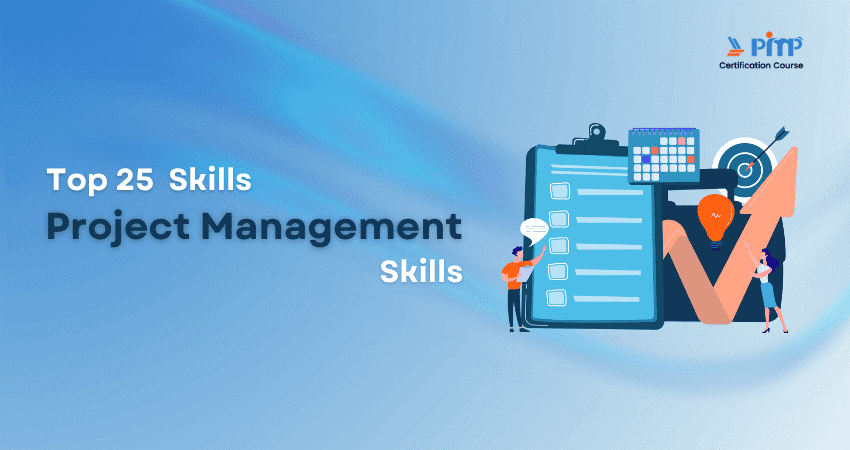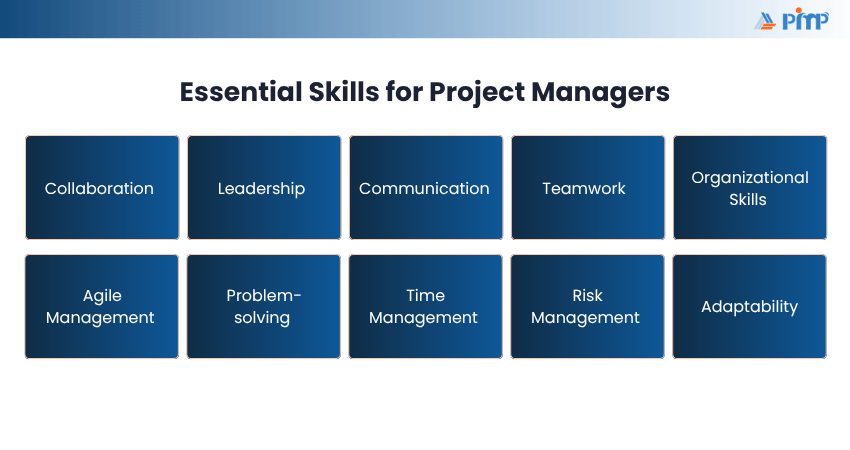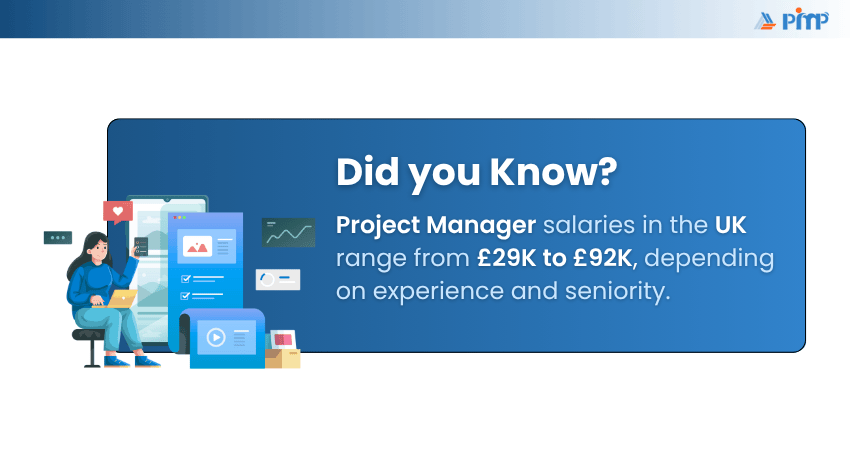







 10 Sep 2024
10 Sep 2024



Table of Contents
1) What are Project Management Skills?
2) 25 Essential Skills for Project Managers
a) Collaboration
b) Leadership
c) Communication
d) Teamwork
e) Organizational Skills
f) Agile management
g) Problem-solving
h) Time Management
i) Risk Management
j) Adaptability
3) How to Improve Project Management Skills?
4) Conclusion
Project Management Skills are the essential abilities used to plan, execute, and complete projects successfully. These include time management, budgeting, communication, leadership, risk management, problem-solving, and organization. They help in setting clear goals, managing teams, and ensuring projects are delivered on time and within scope.
Project Management Skills are not just useful for Project Managers but also for anyone handling tasks or leading teams. Developing strong Project Management Skills boosts efficiency, improves collaboration, and supports career growth in various industries.
Project Management is a balancing act of leadership and problem-solving. It also involves a range of technical abilities. So, check out these 25 essential skills of a Project Manager! They’ll be highly useful and can help you succeed across various project environments.

Collaboration is at the heart of every successful project. It ensures that team members work cohesively, share knowledge, and contribute effectively toward common goals. A collaborative environment encourages creativity and problem-solving.
1) Encourages open communication and idea sharing
2) Fosters team unity and mutual respect
3) Leads to faster issue resolution
4) Enhances innovation and team synergy
Leadership in Project Management goes beyond directing tasks—it’s about inspiring and guiding teams through challenges. A strong leader creates a clear vision, motivates the team, and ensures alignment across stakeholders.
1) Sets direction and aligns the team with project goals
2) Inspires trust, confidence, and motivation
3) Helps resolve team issues and maintain morale
4) Drives accountability and performance
Effective communication keeps projects on track and stakeholders informed. It minimises misunderstandings and builds a shared understanding of goals, roles, and expectations. Project Managers must master both verbal and written communication.
1) Keeps teams aligned and informed
2) Supports clear documentation and reporting
3) Reduces risks of errors and rework
4) Builds strong relationships with clients and stakeholders
Project Managers rely on teamwork to turn plans into outcomes. When everyone contributes their strengths and supports each other, productivity increases, and project goals become more achievable. Strong teamwork fosters trust and respect.
1) Promotes shared responsibility and ownership
2) Encourages knowledge sharing and collaboration
3) Strengthens morale and engagement
4) Reduces individual stress through shared effort
Organizational skills help Project Managers structure tasks, set priorities, and manage multiple workflows efficiently. These skills are critical for staying on schedule and within budget. An organized manager creates clarity and focus for the team.
1) Helps manage deadlines, documents, and meetings
2) Improves resource allocation and task distribution
3) Reduces project delays and confusion
4) Boosts overall efficiency and productivity
Begin your career in Project Management with Certified Associate in Project Management (CAPM) ® Training and boost your confidence!
Agile management promotes flexibility and quick adaptation to change. It encourages iterative development, continuous feedback, and collaboration. Project Managers use Agile to deliver value faster and respond to shifting project needs.
1) Enhances responsiveness to client feedback
2) Encourages frequent progress updates and reviews
3) Supports team empowerment and self-organization
4) Improves delivery through short, focused sprints
Project Managers constantly face unexpected issues, and problem-solving skills are vital to overcoming them. These skills involve identifying the root cause, analyzing options, and making informed decisions. Effective problem-solvers keep projects moving forward.
1) Helps identify and resolve roadblocks quickly
2) Encourages data-driven decision-making
3) Minimizes risks and delays
4) Builds confidence among the team and stakeholders
Time management is essential for meeting deadlines and maintaining project momentum. It involves prioritizing tasks, setting realistic timelines, and avoiding unnecessary delays. Good time management keeps the entire team productive and focused.
1) Ensures timely delivery of project milestones
2) Helps prevent task overload and burnout
3) Increases accountability and discipline
4) Improves overall project efficiency
Risk management helps Project Managers anticipate and address potential problems before they occur. It involves identifying risks, assessing their impact, and planning mitigation strategies. This ensures smoother execution and fewer surprises.
1) Identifies project vulnerabilities early
2) Reduces potential financial and reputational damage
3) Supports contingency planning
4) Builds stakeholder confidence and trust
In a dynamic project environment, adaptability is key. Project Managers must be able to pivot quickly when conditions change or challenges arise. Being adaptable also helps maintain team morale during uncertainty.
1) Encourages flexible planning and decision-making
2) Prepares teams for sudden changes
3) Improves resilience during setbacks
4) Fosters a growth mindset in teams
Critical thinking enables Project Managers to assess situations logically and make well-informed decisions. It involves analyzing information, questioning assumptions, and evaluating outcomes. This leads to better planning and problem resolution.
1) Encourages objective evaluation of options
2) Improves decision-making under pressure
3) Reduces bias and emotional reactions
4) Enhances strategic planning and analysis
Budgeting is essential for financial control in projects. Project Managers must allocate funds, monitor spending, and prevent overruns. Effective budgeting ensures resources are used wisely and projects remain financially viable.
1) Tracks costs and prevents overspending
2) Supports financial forecasting and planning
3) Improves resource allocation
4) Builds client and stakeholder trust
Get your PMI-PBA® Certification and sharpen your skills for success - Start your journey today!
Kanban boards are visual tools that help track workflow and task status. They provide clarity on what’s being worked on, what’s pending, and what’s completed. Project Managers use Kanban to improve transparency and team coordination.
1) Visualizes tasks in real-time
2) Supports continuous delivery
3) Reduces bottlenecks in workflow
4) Enhances team accountability and focus
Cost management focuses on planning, estimating, and controlling project expenses. It ensures the project stays within budget while meeting objectives. Skilled cost managers avoid unnecessary expenditures and maximize value.
1) Sets realistic financial expectations
2) Monitors expenses throughout the project
3) Supports value-driven decisions
4) Aligns cost with project scope and goals
Negotiation is a key skill for resolving conflicts, securing resources, and gaining stakeholder approval. It requires listening, persuasion, and compromise. Effective negotiation leads to win-win outcomes and project alignment.
1) Helps manage stakeholder expectations
2) Secures better deals and terms
3) Resolves disputes without escalation
4) Builds stronger professional relationships
Conflicts are inevitable in project environments, and resolving them quickly is crucial for progress. Conflict resolution involves understanding different perspectives, facilitating discussions, and finding common ground. A skilled manager keeps the team united.
1) Minimizes project delays and tension
2) Encourages open communication
3) Builds a positive team atmosphere
4) Strengthens relationships and collaboration
Get your Program Management Professional (PgMP)® Certification and take your career to new heights – Register today!
Patience allows Project Managers to handle stress, setbacks, and slow progress with calmness. It helps in managing people, processes, and changing requirements without frustration. Patience keeps teams motivated and productive.
1) Supports better decision-making
2) Reduces stress during high-pressure situations
3) Encourages thoughtful responses over reactions
4) Builds a supportive work culture
Project scheduling helps define when and how tasks will be completed. It involves setting timelines, dependencies, and milestones. A clear schedule keeps everyone aligned and accountable for deliverables.
1) Establishes clear deadlines and expectations
2) Tracks progress toward milestones
3) Identifies potential delays early
4) Enhances coordination among team members
Project planning lays the foundation for success. It defines scope, objectives, timelines, and resources. A well-developed plan guides the team, manages risks, and aligns efforts with goals.
1) Clarifies deliverables and roles
2) Helps manage scope and expectations
3) Improves resource and time allocation
4) Supports smooth execution and control
Project Managers must stay updated on the technology relevant to their industry. This allows them to make informed decisions, streamline processes, and better support their teams. Tech awareness also boosts innovation.
1) Improves tool selection and usage
2) Enhances project efficiency
3) Keeps projects competitive and modern
4) Builds technical credibility with stakeholders
The kickoff meeting sets the tone for the entire project. It introduces the team, defines goals, and aligns everyone with the project scope. A strong kickoff ensures a smooth and confident start.
1) Establishes clear objectives and timelines
2) Builds trust among the team and stakeholders
3) Encourages early collaboration
4) Clarifies roles and communication plans
A project roadmap provides a high-level view of objectives, timelines, and deliverables. It helps stakeholders understand progress and future goals. Road mapping keeps everyone aligned with the big picture.
1) Visualizes key milestones and phases
2) Enhances strategic planning
3) Tracks long-term progress
4) Communicates priorities across teams
Interpersonal skills help Project Managers connect with team members, stakeholders, and clients. They involve empathy, active listening, and relationship-building. These soft skills create a positive, collaborative work environment.
1) Strengthens communication and trust
2) Supports conflict resolution
3) Boosts team morale and cooperation
4) Enhances leadership presence
Task management ensures every piece of work is organized and executed efficiently. It involves assigning, prioritizing, and tracking tasks to keep the project on schedule. Clear task oversight improves accountability.
1) Breaks down large goals into manageable steps
2) Assigns responsibilities clearly
3) Tracks task progress and deadlines
4) Prevents delays and overlapping work
Project Portfolio Management (PPM) helps oversee multiple projects and align them with business objectives. It involves prioritizing initiatives, managing resources, and balancing risks. PPM maximizes the value of project investments.
1) Aligns projects with strategic goals
2) Optimizes resource distribution
3) Tracks performance across the portfolio
4) Improves Return on Investment (ROI) and decision-making
Boost your Project Management Skills with consistent learning and hands-on experience. Here’s how:

1) Take Courses: Learn frameworks like Agile or PMP to build a solid foundation
2) Use Tools: Master platforms like Asana, Trello, or Jira for better task control
3) Gain Experience: Manage real projects to sharpen planning and execution
4) Build Soft Skills: Improve communication, leadership, and conflict resolution
5) Seek Feedback: Learn from mentors or team reviews to grow continuously
Developing strong Project Management Skills is key to leading successful projects. By focusing on communication, organization, and adaptability, you can enhance your ability to deliver results on time. This will also contribute to its continuous improvement through feedback and reflection.
Become the expert who steers for the future by earning your Portfolio Management Professional (PfMP)® Certification – Get started now!






© Copyright 2025. All rights reserved. Contact: PMP® TRAINING ACADEMY.


